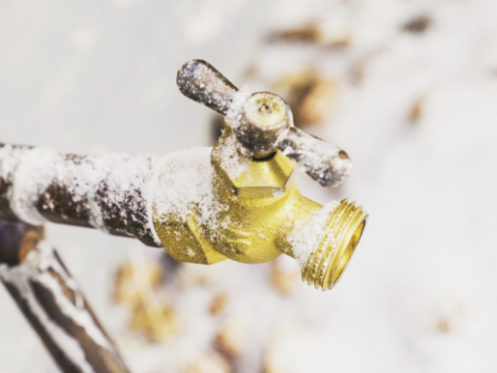Lincoln can be freezing during the winter, and these cold temperatures pose a major risk to your plumbing system. Having your pipes freeze during the winter is a common problem that has the potential to flood your home or business if the frozen pipe bursts. Winterizing your plumbing can make a huge difference in preventing your pipes from freezing, and here is everything you need to know about how it is done.
Protecting Outdoor Plumbing From Freezing
Any outdoor pipes or plumbing fixtures will obviously be much more susceptible to freezing, which is why you should always turn any outdoor plumbing off before winter starts and make sure that the lines are fully drained. Protecting your hose bibs or outdoor sinks from freezing is a fairly simple task that you can do on your own. If you have a sprinkler or irrigation system, you will typically need to hire someone to blow all of the water out of your sprinkler lines since this requires using a large commercial air compressor.
After rolling up all of your hoses, you will want to go inside and close the shut-off valve to every hose bib and outdoor plumbing fixture. All outdoor fixtures should have their own shut-off valve located near where the pipe exits the building. After closing all of the shut-off valves, you can go back outside and open up your hose bibs and outdoor fixtures to make sure that the water lines are fully drained.
Once no more water is flowing, you can then turn all the fixtures off again until you need them again next spring. It is also a good idea to buy insulating covers for all of your hose bibs just in case there is any water remaining inside the pipe.
Insulating Indoor Plumbing
If your home has a crawlspace, then your main water line probably has some branches running through it just underneath your floor. Most trailer houses and some modular homes also have water lines underneath the home. In these situations, you need to make sure that all of the lines are completely wrapped with foam pipe insulation. Otherwise, they can easily freeze since very little heat reaches your crawlspace or underneath your house.
If your house was built on a concrete slab foundation, then there is a good chance that some of your water lines run through your attic instead. If you do have any water lines in the attic, you also need to make sure that they are fully insulated. The insulation on your attic floor is designed to prevent heat from escaping out of the living area. If your attic is well insulated, it will often stay much colder in the winter, and your pipes could freeze if they aren’t fully insulated.
If your pipes aren’t insulated, you can easily find foam pipe insulation at any hardware store, or you can hire someone to do it for you. When insulating the pipes, it is essential that there aren’t any gaps between the insulation where cold air can reach the pipe. It is also always a good idea to secure the insulation with electrical tape to make sure it is tight.
How Air Sealing Can Help Keep Pipes From Freezing
Air sealing involves closing up any gaps or cracks in your home’s structure where cold air could seep inside. The most important places to focus on are the basement and attic. You should also make sure that there aren’t any gaps in your exterior walls or around your windows or doors. It is also important that you check that there is insulation in the holes where the pipes that feed your outdoor plumbing fixtures exit the building.
Full air sealing is something that you will need to have done by a professional, but there are some tasks that you can easily do on your own. For instance, if you feel any drafts around your windows or doors, you can remove the old caulking and then reseal around the opening to ensure no air can leak in. You can also fix minor cracks or gaps in your foundation with mortar or sealant.
If your home has a crawlspace, you need to make sure that the air vents are closed or blocked off. The vents work to keep the crawlspace cooler during the summer so that humidity doesn’t build up and lead to mold issues. If the vents are left open in the winter, all they will do is let lots of cold air in and increase the chances of your pipes freezing.
Additional Steps to Keep Pipes From Freezing in Extreme Cold
The Lincoln area typically has at least a few days every winter when the temperature plummets to well below zero. On these extremely cold days, you should also take a few additional steps to protect your plumbing. One thing that can make a major difference is to slightly open every faucet and plumbing fixture so that you have just a trickle of water running. This will keep water flowing through all of your pipes, which makes them less likely to freeze.
Kitchen and bathroom sinks, located on an exterior wall, are often the most prone to freezing during extreme cold spells. To help prevent this, it is a good idea to leave your cabinet doors open so that warm air can circulate underneath the sink. You can also use a fan to help direct warm air underneath the cabinet or run a space heater on low if you know the pipes under your sink are prone to freezing.
Full Winterization
If you plan on taking a longer vacation during the winter or your home will stay vacant for more than a few days without someone checking on it, you may want to consider having your plumbing system fully winterized. After all, there is always a chance that your furnace will go out and your heating will stop working. Should your house be without heat for more than a few hours during an extreme cold snap, your pipes could easily freeze and rupture. This could mean coming home to find your house flooded and everything covered in a thick layer of ice.
Fully winterizing your plumbing involves shutting off the water supply and then draining and blowing out all the pipes, just like you do with a sprinkler system. You should always hire one of our licensed plumbers for this type of job to avoid damaging the pipes.
Once the water lines have been fully drained, it is necessary to also drain the toilet and your water heater to ensure that these also can’t freeze and break. If all of the water can’t be removed from the toilet tank, our plumber adds antifreeze to the tank to ensure that it can’t freeze and cause the porcelain to crack. Antifreeze can also be added to every drain to keep the water that remains inside the P-trap from freezing and causing the PVC pipe to crack.
At John Henry's Plumbing, Heating, Air, and Electrical, we specialize in residential and commercial plumbing services as well as septic services. Our team can help you with winterizing your plumbing or any repair needs you may have. We also install most types of plumbing fixtures and appliances. In addition, our certified HVAC technicians are here for any of your heating or cooling needs, including duct cleaning and providing UV air sanitizers. Contact John Henry's Plumbing, Heating, Air, and Electrical today if you need help with winterizing your plumbing or if you need to schedule any residential or commercial plumbing or HVAC service in the Lincoln area.

